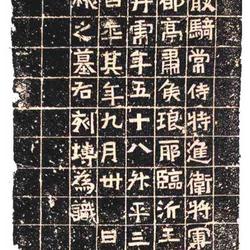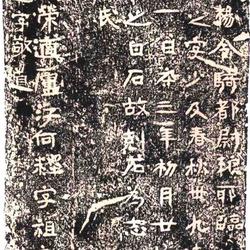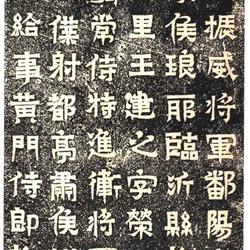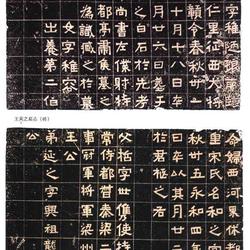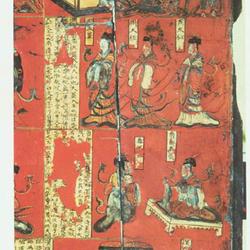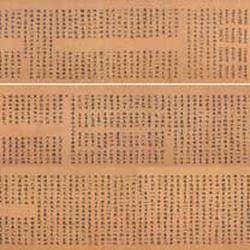"Xie Kun's Epitaph" was unearthed on September 10, 1964, from the remains of the Qijiashan tomb outside Zhonghuamen, Nanjing. The figures were removed from the horizontal waist by bulldozers. Founded in the first year of Taining in the Eastern Jin Dynasty (323)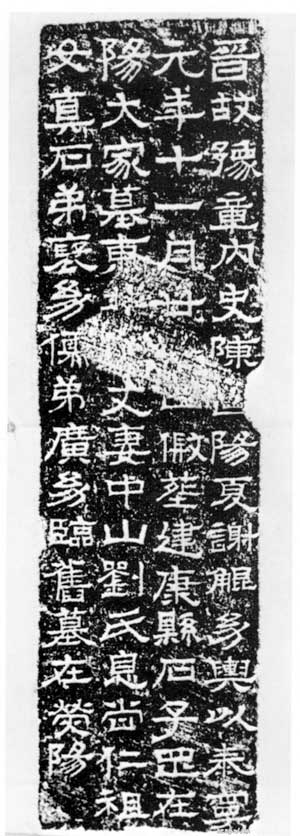 November. The zhi is 60 cm long, 16.5 cm wide and 11 cm thick. Its texture is granite. There are four lines in total, with seventeen characters in each line. The last line is one less character, totaling sixty-seven characters.
November. The zhi is 60 cm long, 16.5 cm wide and 11 cm thick. Its texture is granite. There are four lines in total, with seventeen characters in each line. The last line is one less character, totaling sixty-seven characters.
Explanation:
In the internal history of Yuzhang of the Jin Dynasty, Chen Yangxia, Xie Kun's younger brother, died on November 28th in the first year of Taining, and was buried in Shizigang, Jiankang County, four feet northeast of Yangjia Tomb. . His wife is the Liu family of Zhongshan, Xishang Renzu, Jurchen Stone. My younger brother Bao Youru, my younger brother Guang Youlin, the old tomb is in Yingyang.
Appendix: "From the Unearth of Wang Xie's Epitaph to the Authenticity of the Lanting Preface" (Guo Moruo)
——Xie Kun’s epitaph
Xie Kun's epitaph was unearthed on September 10, 1964, from the remains of the Qijiashan tomb outside Zhonghuamen, Nanjing. Wenfan's four lines were excavated by bulldozers, but they can probably be filled in at will. The text is as follows:
"In the internal history of Yuzhang of the Jin Dynasty, Chen [Guo] Yangxia, Xie Kun's younger brother, died on November 28th of the first year of Taining, and was buried in Shizigang, Jiankang County, northeast of Yangjia Tomb [4] Father-in-law. His wife is the Liu family of Zhongshan. He is the ancestor of Xishang Renzu and has a Jurchen stone. His younger brother Bao Youru and his younger brother Guang Youlin have their old tomb in Yingyang."
Xie Kun, the stone carving is written as Xie □, the character "Kun" was changed from "Cong Jiao", which is a false character, and the character "鏄" was also written from "Cong Jiao". Such radical corruptions are common in stele inscriptions, such as bamboo turning into straw, showing side turning into grain, double side changing to single side, day side changing to eye side, etc., the list goes on and on. Xie Kun was a famous scholar in the early Eastern Jin Dynasty. The "Biography of Xie Kun" in Volume 49 of "Book of Jin" says: "Xie Kun, also known as Youyu, was a native of Yangxia in the state of Chen. ... Kun Shao was well-known, simple, knowledgeable, and not dignified. He liked old age, easy things, and was capable. He is good at singing and playing drums and harps. ... He took refuge in Yuzhang. ... In order to gain merit from Du Tao, he was granted the title of Marquis of Xianting." When General Wang Dun wanted to betray the imperial court at that time, he once advised him politely.
Later, Xie Kun went to serve as the prefect of Yuzhang County. History says that "he came to have a clean government and the people loved him. He was looking for a dead officer at the age of forty-three. ... He gave Taichang a posthumous gift, and his posthumous title is Kang."
He is one of Wang Yan's four friends. "Book of Jin·Biography of Wang Cheng" "At that time, Wang Dun, Xie Kun, Yu □, and Ruan Xiu were all friendly to Yan, and they were named four friends." His son Xie Shang and his son Xie An are all mentioned in "Book of Jin" .
"The Biography of Xie Shang": "Xie Shang, courtesy name Renzu, is the son of [Xie] Kun, the prefect of Yuzhang. ... He was worried about his father when he was more than ten years old."
"The Biography of Xie An": "Xie An's courtesy name is Anshi, and he is still his younger brother. His father is Pei, Taichang Qing." Pei in the "Book of Jin" is the praise in the stone carvings.
"Book of Jin" calls it "Yuzhang Taishou", "Shi Shuo Xin Yu" and "Jin Yang Qiu" quoted by Liu Xiao's annotation also call it "Yuzhang Taishou", but the stone carvings refer to it as "Yuzhang Internal History". According to the "Book of Jin·Zhiguanzhi": "The governor of each kingdom is responsible for the post of governor." It is also said that "the king changed the prefect to the internal history". The prefect and the internal historian have the same powers, but there are some differences in their names. However, Yuzhang County does not belong to the kingdom, but the prefect can also be called the internal history. It can be seen that by the Eastern Jin Dynasty, even this small difference in title disappeared invisibly.
There is a genealogy of Xia Xie in Chen Guoyang in "Shishuo Xinyu·Personal Name Genealogy". Xie Kun is listed in the second generation, and his younger brother has Pei but not Guang. The description about Xie Xi is as follows:
"Pei, Hengzi, named Youru. Taichang Qing, Minister of the Ministry of Personnel."
According to the stone carvings, Xie Kun "died on November 28th in the first year of Taining (AD 323)", and extrapolating forty-three years back, it can be seen that Kun was born in the first year of Taikang (AD 280), Emperor Wu of the Jin Dynasty. He was born in the early years of the Western Jin Dynasty, experienced the southern crossing from Yongjia, and belonged to the so-called "famous people who crossed the river".
It was only seven years after the crossing to the south in the first year of Taining. Needless to say, the celebrities at that time still wanted to restore the Central Plains. The famous story of "Weeping in Xinting" is worth quoting here:
"People crossing the river, every beautiful day, always invite each other to a new pavilion to borrow flowers and have a feast. Zhou Hou (□) sat in the middle and sighed: 'The scenery is not special, just because the mountains and rivers are different.' They all looked at each other and shed tears. . But Prime Minister Wang (Guide) quietly changed his color and said: 'When we work together with the royal family to conquer China, why should we be prisoners of Chu and face each other?'" (Shishuo Xinyu·Yu Chapter)
This clearly expresses the mood of the "celebrities crossing the river". This same state of mind is also expressed in "Xie Kun's Epitaph". The so-called "fake burial in Shizigang, Jiankang County" and the so-called "old tomb in Yingyang" have not forgotten that they still need to "conquer China". The poem written by Lu You of the Southern Song Dynasty when he passed away included the words: "Wang Shibei sets the day for the Central Plains, and family sacrifices do not Don't forget to tell the old man." This same regret, no matter how broad-minded Xie Kun was, probably lingered in his mind when he was dying. He is temporarily buried in the south and will be buried in the "old tomb" in the future. Although this hope came to nothing, "Epitaph" has been rediscovered today, which is an unexpected blessing for Xie Kun.
"Shizigang" can be found in the "Three Kingdoms·Wu Zhi·Zhuge Ke Biography", which states that "there is a Changling mausoleum in the south of Jianye, named Shizigang. The person who is buried is Yiyan." Liu Xiao, under the article "Taoist Taoist Gaozao does not speak Chinese" in Shishuo Gang, that's when he was buried." Also in "Chen Shu·Ren Zhongzhuan", "The Sui general Han Qinhu marched from Xinlin. Zhongnai led several cavalry and surrendered to Shizigang, and still led the captured Hu army into Nanyemen. .”
"Yang Family" refers to Aunt Yang, who is related to the ancient music family. "Erya·Shi Qin" "Father's sister is an aunt". It is accurate to say that "Xingzhi Epitaph" is "buried on the left side of Xian Kao's tomb", and it is also accurate to say that the tombs of descendants of Yan Han of the same period are buried at the southern foot of Laohu Mountain in Nanjing (see details below). It can be inferred that this person may be Xie Kun His sister died in Jiangzuo after crossing south. Some comrades disagree with this opinion and believe that the "Yang Family" are not members of the Xie clan, but were originally buried in Shizigang. The evidence is that Wei Jie's "Shishuo Xinyu: Sadness and Death Chapter" records the funeral in the sixth year of Yongjia, and notes: "Yongjia Liu's name was □. He died on June 20th in the sixth year of his reign and was buried in the east of Xu Hui's tomb in Nanchang City.
The relationship between Xu Hui and Wei Jie in this case is not stated in the note. In my opinion, the two may be either relatives or friends. Friends, in the old days, were one of the five moral relationships, and they were not unrelated. But whether "Yang Family" is Xie Kun's sister or not, I only said "possibly" and did not make a conclusion. I hope that the tomb of "Yang Jia" will be discovered one day in the future.
Xie Kun's wife is "Zhongshan Liu" and may have some connection with Liu Kun. "Book of Jin·Biography of Liu Kun": "Liu Kun, courtesy name Yueshi, was a native of Weichang, Zhongshan, and the queen of King Sheng Jing of Zhongshan, Han Dynasty."
Xie Kun has two sons, but the eldest son has long since died. The second son is Xie Shang. "Book of Jin·Xie Shangzhuan" says: "I lost my brother at the age of seven, mourned and mourned, and my relatives were different." "Good at music, versatile in various arts." "Succeeded from his father's title of Marquis of Xianting." "In Yonghe, I paid homage to Shang Shu Pu She, He was appointed as the military commander in Jiangxi and Huainan. He was a former general and the governor of Yuzhou. He was assigned to Shizhong and Pushe as before. He was in charge of Liyang. He was also the military commander of the five counties in Yuzhou and Yangzhou. He made great achievements during his tenure." Later, he stayed in the capital and was in charge of Pusheshi. . "Xunjin's name is Zhenxi General, Zhenshouyang." "At the beginning of the rise of peace, he also entered the military affairs of Yu, Yi, You, and the four prefectures." He died of illness at the age of fifty and had no children. Historically, it is said that Xie Shang initiated the music of bells and stones in the Eastern Jin Dynasty.
Xie Po had six sons, Yi, Ju, An, Wan, Shi and Tie; An was the most famous. In the eighth year of Taiyuan (383 AD) of Emperor Xiaowu, Fu Jian of the former Qin Dynasty attacked the Eastern Jin Dynasty , claiming to have millions of people. Xie An was appointed as the commander-in-chief of the expedition. Later, he defeated Fu Jian in Feishui. This was the famous battle of Feishui in history. After the victory, Xie An "went to worship the Taibao with his presidential merits." Following his request for the Northern Expedition, he went to the 15 states of Yang, Jiang, Jing, Si, Yu, Xu, Yan, Qing, Yi, You, Bing, Ning, Yi , Yong, and Liang to oversee the military affairs, and added Huang Yue. It's really outstanding. But his Northern Expedition was not successful. He died at the age of sixty-six.

